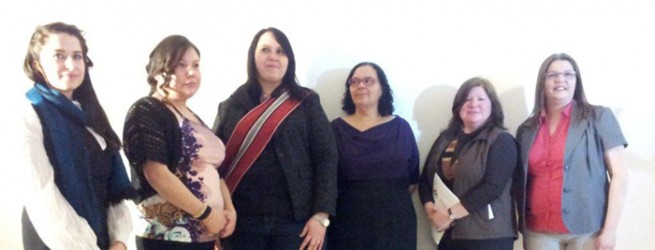Article Origin
Volume
Issue
Year
Honouring Indigenous Women: Hearts of Nations, Vol. 2 was launched Feb. 12 at the Toronto Birth Centre in the city’s Regent Park. The book is a celebration of Indigenous womanhood – the joy and strength, the pain and sadness, and the challenges. The launch was presented by Muskrat Magazine, the Toronto & York Region Metis Council, and The Sound of My Heart Collective.
The book features a collection of stories, poetry, essays and visual art by more than 60 artists from across Turtle Island. Many of the contributions tell of the journey to recognize how Indigenous women have been shaped by colonialism and the continuing and enduring struggle against its insidious and tragic effects.
Rebeka Tabobondung, publisher of Muskrat Magazine, is from Wasauksing First Nation near Parry Sound, Ont. She was thrilled when Muskrat was asked to present the launch because “I see the power that writing holds for the individual, to help them deal with difficult stuff, but also to express love and strength,” she said. “It’s very symbolic to hold this launch in a birth centre,” she added, “because what we are doing is re-birthing a healthy nation.”
Pei-ju, co-founder of The Sound of My Heart Collective, said she started learning about Aboriginal people and colonialism when she moved to Canada from Taiwan a few years ago.
“I had no idea of the Indigenous struggle here,” she said.
One of the issues that touched Pei-ju was the extent of the violence against Aboriginal women and how the media contributes to this by reinforcing negative stereotypes.
“I wanted to create a tool to raise awareness and where the women could speak for themselves,” she said. “I wanted to help create something to show the strength of Aboriginal women to counter what the media does.” She received more than 100 submissions when she put out the call, a sure sign that Indigenous women are anxious to tell their stories.
Faith Turner, a member of the Moose Cree First Nation in Ontario, drove eight hours, one way, to be at the launch. The suicide rate among the youth in her community was so high, she told the audience, that a state of emergency was declared. She read An Indigenous Woman’s Prayer, that says in part:
“We are looking to the dark clouds to subside.
Many of our lives have been shattered, broken and bent...please build us up stronger.”
The care and concern for family and the collective in Turner’s poem resonates throughout the selections, both in the written pieces and the visual art selections. These come from women who aren’t concerned just about themselves. They’re working towards the survival of Indigenous nations and Indigenous culture.
The authenticity of the voices is breathtaking in its bravery and its beauty.
Special guest Audrey Huntley, co-founder of No More Silence, spoke about the community data base she’s developing, primarily for Ontario of women who have died violent deaths or are missing. Out of 70 females who died between 1970 and 2013, the oldest was 72 and the youngest was two years old. About 18 were from the 1970s to 1990s. The bulk of the names were after 2000, “so it’s not decreasing,” Huntley said, “even though the silence is broken. We all really need to keep talking about this.”
A free copy of the book may be downloaded at: www.ipsmo.wordpress.com. It is also available for $10 to $20 (sliding scale based on income) by emailing: ipsmo@riseup.net. Proceeds from sales will go towards printing more copies.
- 2679 views

